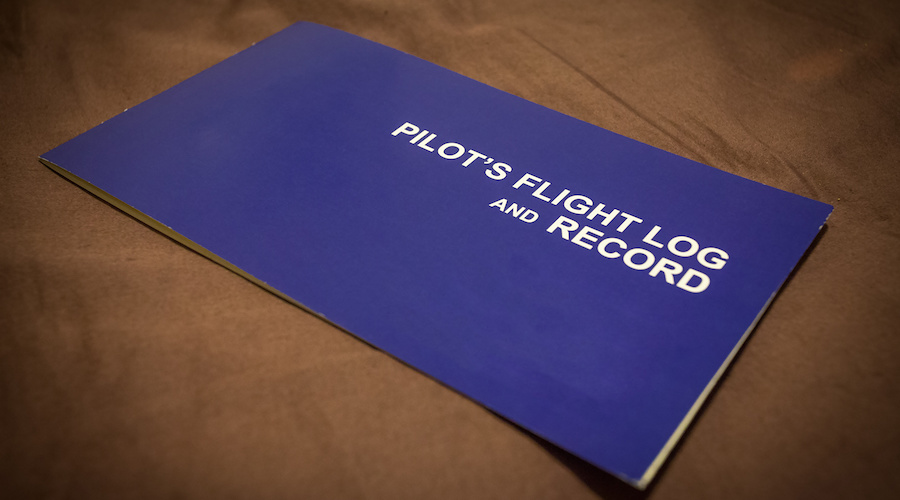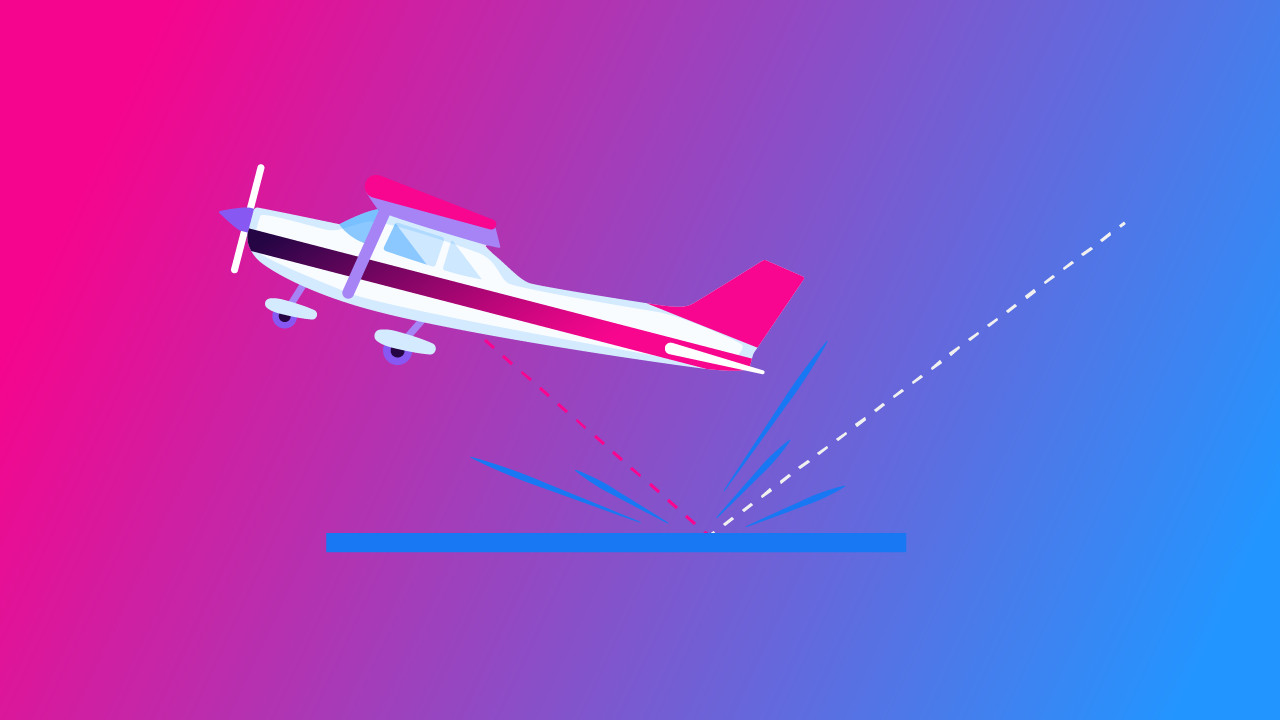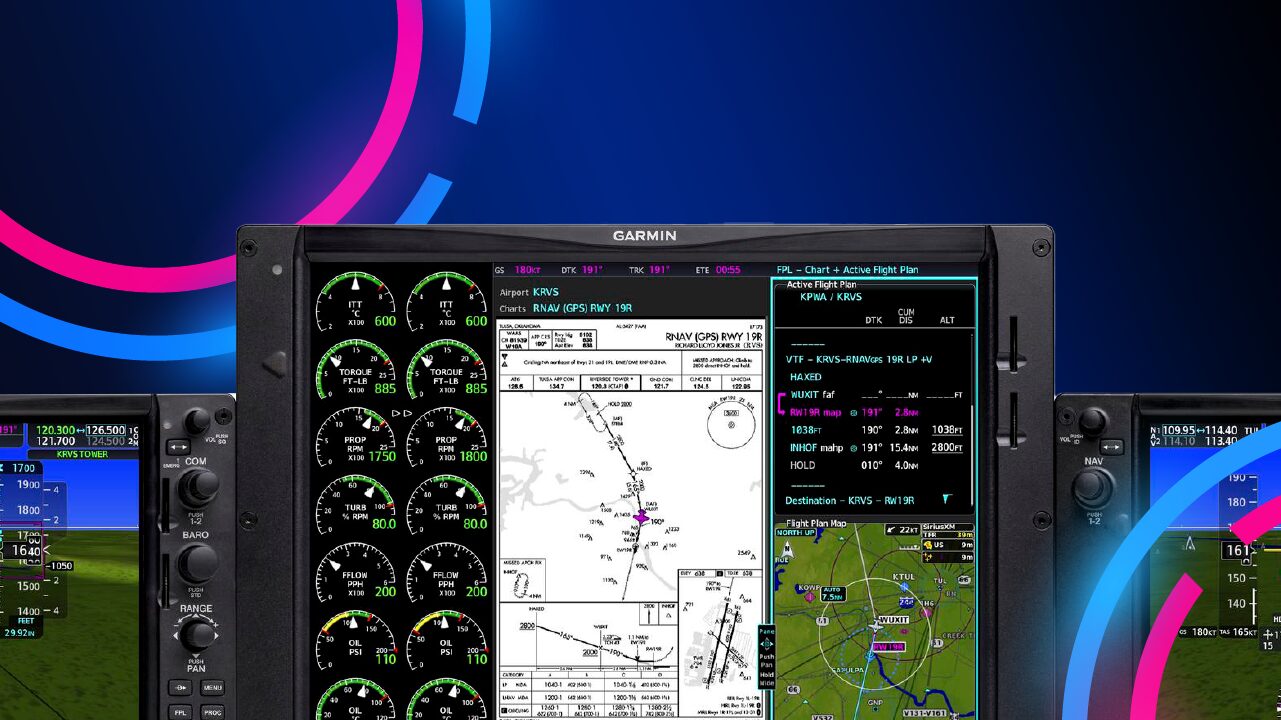-
Key Takeaways
-
What Does It Take To Become a Professional Pilot?
- Private Pilot License
- Instrument Rating
- Commercial Pilot License
- Further Training and Certification
- Time and Financial Commitment
- What Makes a Great Pilot?
-
Do You Need to Be Good at Math?
- Math in Flying
- Computation Tools and Calculators
-
Is the Life of a Pilot Difficult?
- Long Hours and Irregular Schedules
- Responsibility for Passenger Safety
- Managing Stress and Fatigue
- Work-Life Balance and Family Life
- Ongoing Training
-
Is It Worth It To Become a Pilot?
- Career Satisfaction
- Financial Benefits
- Increasing Demand and Job Security
- Ability to Travel
- Good Working Relationships
-
Tips for Succeeding As a Pilot
- Choosing the Right Flight School
- Finding a Mentor and Networking
- Overcoming Challenges
- Continuing Education and Staying Certified
- Online Resources and Courses
-
Conclusion
If you dream of becoming a pilot, you might be wondering if it’s a hard career to enter. You see those men and women in uniform and ask yourself, what will it take to get there?
Just like the aircraft you will fly, you’ll go through highs and lows, and moments where you’ll have to correct your course. You might even have to crunch some numbers. But if you plan for the journey wisely and anticipate the obstacles ahead, your destination will be worth it.
So, is it hard to be a pilot? Let’s explore the challenges and the rewards of becoming a skilled aviator.
Key Takeaways
- To become a pilot, you must invest a considerable amount of time, effort, and money.
- The math involved in flying is relatively simple, and tools will make it easier.
- Pilots face many challenges, but the rewards and incentives make them worthwhile.
- Be strategic when making career plans and maximize the resources available to you.
What Does It Take To Become a Professional Pilot?
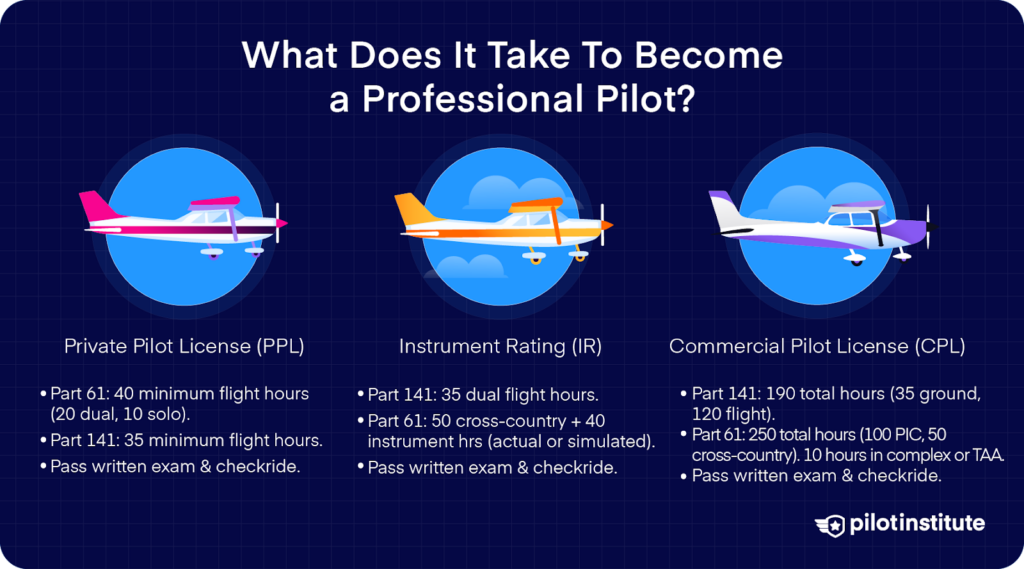
You’ll be in training during the first leg of your pilot journey. This time will be full of studying, exams, and completing requirements every step of the way.
The Federal Aviation Administration (FAA) oversees the licensing process in the U.S. Depending on what kind of pilot you want to be, there are many different paths you can take.
Private Pilot License
Whatever your flying goals are, the Private Pilot License (PPL) is the first certificate you’ll need to earn. This will be the bedrock of your life as a pilot, and you’ll build everything else from here.
With your PPL, you’ll be able to fly small aircraft for personal trips. If you plan to fly as a hobby, this license is what you’ll need. If you plan to become a professional pilot, you will still need to start with your PPL.
You’ll need to complete ground school training, either online or in person, where you’ll study aviation theories with a certified ground instructor.
Here’s a rundown of what you’ll need:
- Age Requirement: At least 17 years old (16 for glider or balloon).
- Medical Certificate: At least a third-class FAA medical certificate (or BasicMed for some pilots).
- Ground School: Complete ground school training (online or in-person).
- Flight Training:
- Part 61: Minimum 40 flight hours (including 20 dual, 10 solo).
- Part 141: Minimum 35 flight hours.
- Checkride: Pass an FAA written knowledge exam and practical flight test (checkride).
Here are the resources and official documentation:
- FAA Part 61.109 – Aeronautical Experience for Private Pilots
- FAA Part 141 – Flight Training Schools
- FAA Medical Certificate Information
- FAA Airman Testing and Checkride Information
Instrument Rating
In order to fly in a wider range of conditions, you’re going to need an Instrument Rating (IR). It gives you the ability to fly in Instrument Flight Rules (IFR).
You’ll train how to rely on instruments instead of visual cues. For professional pilots, this rating is a must-have. But even if you’re sticking to your PPL, its value comes from the flexibility and sense of safety you will get.
Here’s a rundown of what you’ll need:
- Hold a Private Pilot License (PPL).
- Medical Certificate: At least a third-class FAA medical certificate.
- Flight Training:
- Part 61: Minimum 50 hours cross-country time (as PIC) + 40 hours instrument time (actual or simulated).
- One cross-country flight of 250 nautical miles, including three different instrument approaches at different airports.
- Part 141: Minimum 35 hours of instrument training.
- One cross-country flight of 250 nautical miles, including three different instrument approaches at different airports.
- Part 61: Minimum 50 hours cross-country time (as PIC) + 40 hours instrument time (actual or simulated).
- Written Exam: Pass the FAA Instrument Knowledge Test.
- Checkride: Pass the FAA Instrument Practical Test (Checkride).
- Flight Experience Requirements:
- 15 hours of instrument flight training with a CFII (Certified Flight Instructor – Instrument).
Here are the resources and official documentation:
- FAA Part 61.65 – Instrument Rating Requirements
- FAA Part 141 – Instrument Training Schools
- FAA Airman Testing Information
Commercial Pilot License
Do you plan to have a career in flying? Then you should go for a CPL, or a Commercial Pilot License. With this certificate, you’ll be able to work and receive compensation as a pilot.
The flight hours you’ll need may depend on the training path and school you select.
Here’s a rundown of what you’ll need (based on single-engine airplane):
- Age Requirement: At least 18 years old.
- Hold a Private Pilot License (PPL).
- Medical Certificate: At least a second-class FAA medical certificate.
- Flight Training:
- Part 61: Minimum 250 total flight hours, including:
- 100 hours as Pilot-in-Command (PIC).
- 50 hours of cross-country flight time.
- 10 hours in Complex or TAA.
- 10 hours of instrument training (5 hours in a single-engine airplane).
- One daytime and one nighttime cross-country flight (each 2 hours, >100 NM straight-line distance).
- 3 hours of checkride prep with an instructor (within 2 months of the test).
- 10 hours of solo or PIC time, including:
- One 300 NM cross-country flight (3 landings, 250 NM straight-line leg).
- 5 hours of night VFR (10 takeoffs/landings at a towered airport).
- Part 141: Minimum 190 total flight hours, including:
- Instrument Rating (or concurrently enrolled in an instrument course and must pass before CPL completion).
- Ground Training
- 35 hours of aeronautical knowledge training covering:
- Part 61: Minimum 250 total flight hours, including:
- FAA regulations, accident reporting, aerodynamics, meteorology.
- Aircraft operations, performance, weight & balance
- Navigation, decision-making, and emergency procedures.
- Flight Training
- 120 total flight hours, including:
- 55 hours of instructor-led training, covering:
- 10 hours of instrument training (5 in a single-engine airplane).
- 10 hours in a complex, turbine-powered, or TAA aircraft.
- 2-hour daytime cross-country flight (>100 NM straight-line distance).
- 2-hour nighttime cross-country flight (>100 NM straight-line distance).
- 3 hours of checkride prep (within 60 days of test).
- 55 hours of instructor-led training, covering:
- Written Exam: Pass the FAA Commercial Pilot Knowledge Test.
- Checkride: Pass the FAA Commercial Pilot Practical Test (Checkride).
Here are the resources and official documentation:
- FAA Part 61.129 – Commercial Pilot Requirements
- FAA Part 141 – Commercial Pilot Training
- FAA Airman Testing Information (CPL)
Further Training and Certification
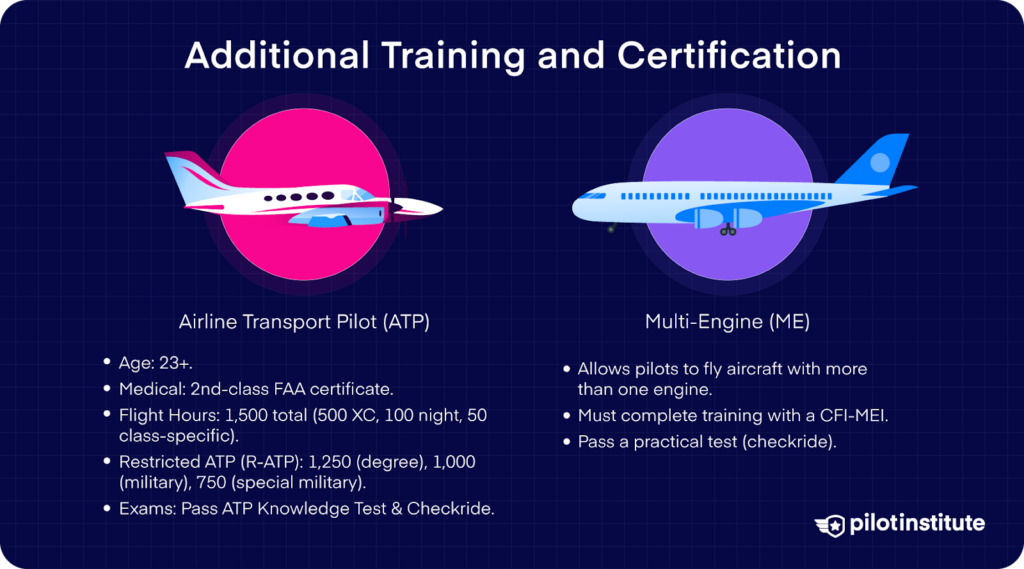
While you can technically work as a pilot with just a CPL, in reality, most aviation employers typically look for more.
Look up airline pilot positions at job posting sites; you’ll find that the average requirements are either thousands of flight hours or advanced ratings and certifications.
To give yourself a fighting chance at landing a job, you’re going to need further training and flight experience.
Adding a Multi-Engine (ME) Rating lets you fly aircraft with more than one engine. This is great if you want an airline career and a higher-paying job.
The Airline Transport Pilot (ATP) Certificate is the highest certification you can earn. You’ll need it to act as a captain for airlines. By this point, most of the costs are tied to logging in the required 1,500 total flight hours for the ATP certificate.
You can build these hours through various means, such as working as a pilot, funding your flights yourself, or using approved flight simulators within the limitations of the regulations.
Here’s a rundown of what you’ll need:
Multi-Engine Rating (ME)
- Hold at least a Private Pilot License (PPL).
- Allows pilots to fly aircraft with more than one engine.
- No minimum flight hour requirement, but must complete training with a Certified Flight Instructor – Multi-Engine (MEI).
- Pass a practical test (checkride).
Airline Transport Pilot (ATP) & R-ATP Certificate Requirements
- Age Requirement: At least 23 years old (21 years old for R-ATP)
- Medical Certificate: At least a second-class FAA medical certificate.
- Flight Hours:
- 1,500 hours – Standard ATP requirement for pilots trained under Part 61 or outside an approved program.
- 1,250 hours – If you graduate with an aviation-related associate degree from an FAA-approved Part 141 program.
- 1,000 hours – If you graduate with an aviation-related bachelor’s degree from an FAA-approved Part 141 program.
- 750 hours – If you are a former military pilot.
- Written Exam: Pass the FAA ATP Knowledge Test
- Checkride: Pass the FAA ATP Practical Test (Checkride)
Here are the resources and official documentation:
- FAA Part 61.159 – ATP Certificate Requirements
- FAA Part 61.160 – Restricted ATP (R-ATP) Requirements
- FAA Airman Testing Information
- FAA Multi-Engine Rating Requirements
- FAA Part 141 Flight School Requirements
Time and Financial Commitment

For every milestone you reach, you’ll need to pass written, oral, and/or practical tests. On top of that, you’ll need to take FAA medical exams to ensure you’re physically fit to fly. You’ll also need to do regular checkups throughout your career.
How long will it take for you to become a pilot? Well, that depends on how frequently you train.
Getting a Private Pilot License can take a few months if you train full-time. To become an airline pilot, the journey can usually take around two and a half years if you take an accelerated ATP course. Otherwise, it could take longer, especially if you’re balancing work and school.
In terms of budget, you can expect to spend roughly $100,000 from student to ATP certificate.
That’s a big investment, but there are ways to make it more affordable. You can check out scholarships and financing options. Some airlines also have sponsorship programs, where they’ll fund your training in exchange for a certain commitment, like working in the company for a required number of years.
What Makes a Great Pilot?
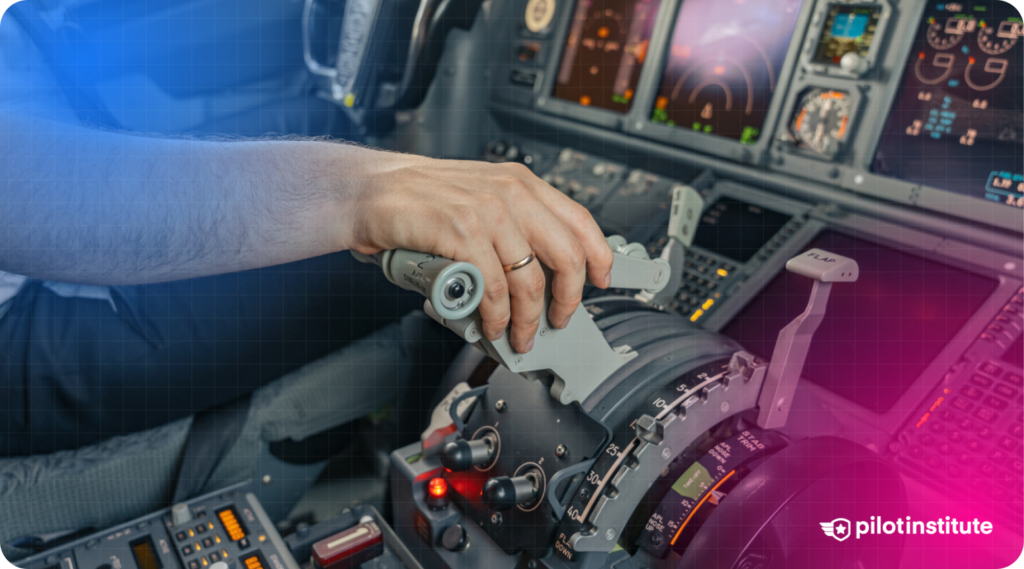
Not just anyone can be a pilot—it takes substantial qualities to succeed.
You will need discipline because you must follow strict procedures and stay focused, even during long flights.
Problem-solving skills are also necessary. Unexpected situations can arise at any point in your flight. To avoid disaster, you’ll have to make quick and accurate decisions.
In your life as a pilot, you’ll be facing issues like changes in weather, mechanical problems, or traffic delays. You’ll need to think on your feet and adapt to quickly changing conditions. When facing these challenges, you have to be flexible.
Like any skill, these values can be developed with experience. The journey will teach you lessons that will mold you into a safe and competent pilot.
Do You Need to Be Good at Math?
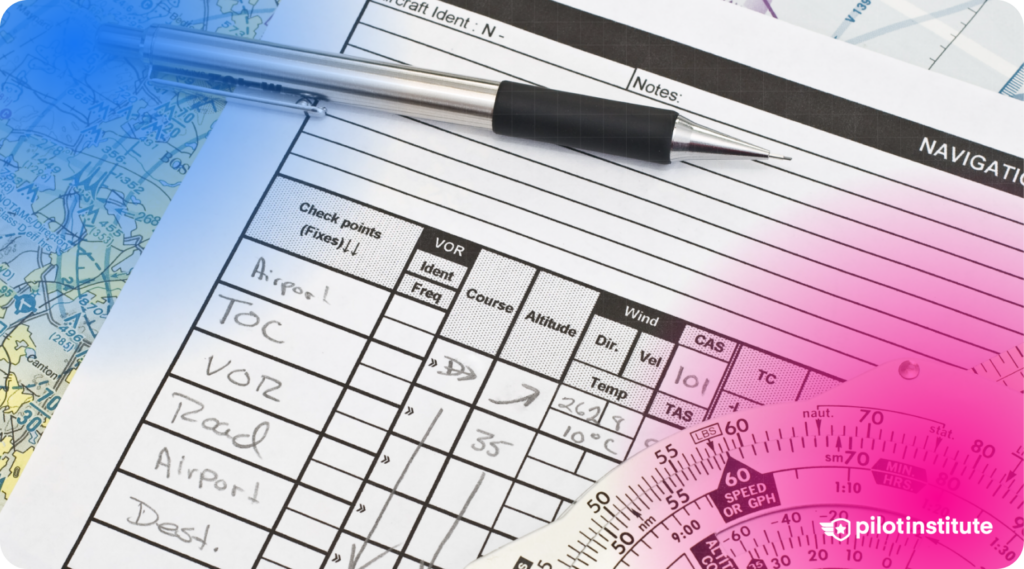
But how about math; do you need to be a math genius to become a pilot? The good news is: Not at all!
Math will be part of your everyday life, but you don’t need to be good at calculus to be a great pilot. Instead, pilots use practical math skills, things like basic arithmetic, time calculations, and fuel management.
Math in Flying
What type of math will you actually be doing? When creating a flight plan, you’ll be doing distances, speeds, times en route, and fuel burn. These will involve simple multiplication and division, which you can surely manage!
You’ll have to figure out how to create a flight plan through different time zones, particularly for extended cross-country flights.
Crosswinds will be a frequent issue, so you’ll have to know which direction to head to correct for the wind.
And when ensuring the aircraft’s weight is balanced, you’ll be doing—you guessed it—weight and balance.
If all this seems overwhelming now, don’t worry! Your training programs are created to show you all you need to know, even if math isn’t your strong suit.
At flight school, your training will deconstruct mathematical concepts in a straightforward, step-by-step way. You’ll be taught effective techniques to perform quick math computations.
And then you’ll get to apply these skills in real-life situations during training flights. By the time you get your license, these calculations will come naturally.
Computation Tools and Calculators
And here’s some more good news: There are plenty of tools available to help you with the math! Pilots use the E6-B, a traditional flight computer that will help calculate wind correction angles, fuel burn, and ground speed.
Modern technology continues to make life easier for many pilots. Aviation apps and electronic flight bags make complex computations much more manageable.
Is the Life of a Pilot Difficult?
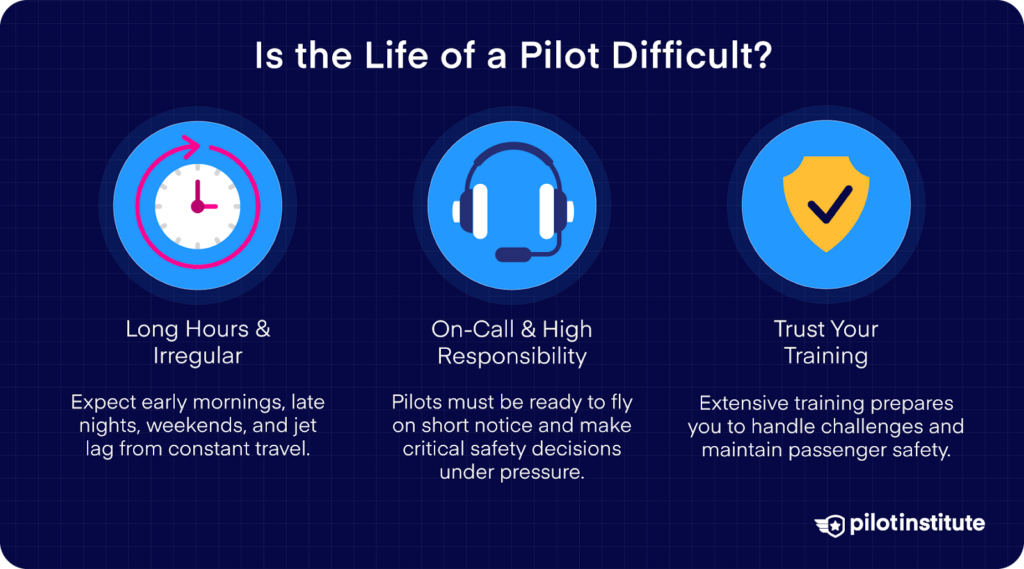
Many people think of a pilot’s life as a glamorous one, and it’s easy to see why. You’d get to travel the world, stay in fancy hotels, and have an exciting career—but is it really that simple?
The truth is that being a pilot isn’t all fun and sunshine. The job comes with its own challenges that you need to understand to make an informed decision.
Long Hours and Irregular Schedules
Pilots often work long hours and have irregular schedules. Unlike a typical 9-to-5 job, duty can call you in early mornings, late nights, weekends, and holidays.
You may fly for several hours at a time or be on call to fly on short notice, typically due to a staff shortage.
Traveling long distances means dealing with jet lag and changing time zones. It could be tough to maintain a sleep schedule when you’re always on the go.
Responsibility for Passenger Safety
Another major challenge is the responsibility for passenger safety. The job involves making a lot of critical decisions under pressure with so much at stake.
Does that sound overwhelming? It’s important not to let the pressure get to you. Remember, you will undergo extensive training to prepare you for these responsibilities.
Follow established procedures and trust your training. As long as you take every measure to fly safely, you are doing your job well.
Managing Stress and Fatigue
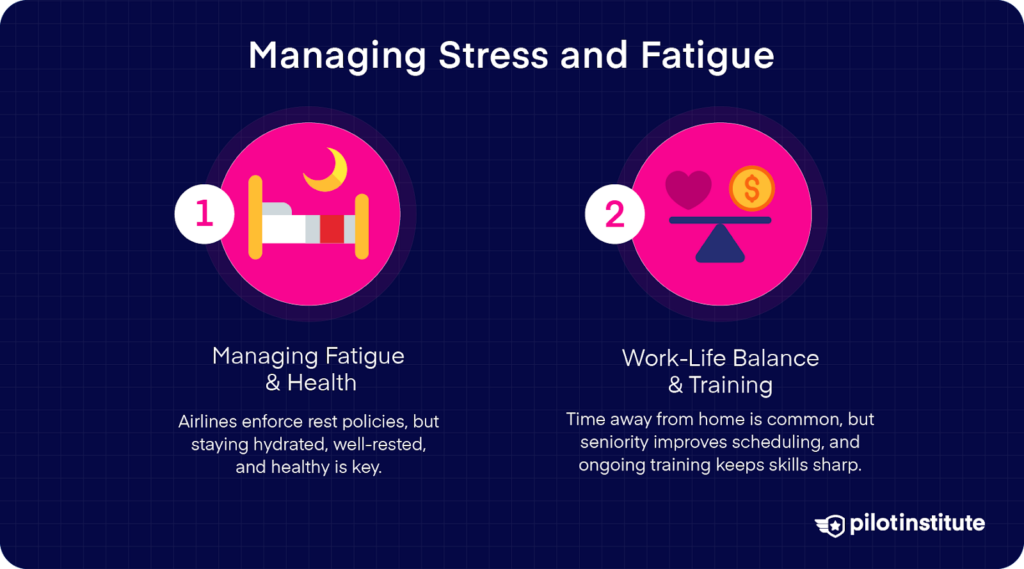
It can’t be overstated how impactful stress and fatigue are to your performance. Many airlines have strict policies to ensure you get enough rest, but fatigue can still be an ongoing challenge.
You’ll also undergo regular medical assessments to check that you’re physically and mentally fit to fly.
Despite this, simple strategies will help you stay at peak performance. Stay hydrated, eat well, and get some quality sleep.
Work-Life Balance and Family Life
Work-life balance can also be tricky. Pilots spend a lot of time away from home, sometimes for weeks at a time. This can make it hard to maintain relationships and family life.
But even so, making it all work is completely possible. Use your scheduled downtime wisely. And once you gain enough seniority, some airlines might offer you a more predictable schedule, which helps a lot in making plans.
Ongoing Training
You’ll have to spend a significant amount of time in training every year, both in the classroom and the cockpit. This includes flight reviews, which are usually bi-annual.
Even though this can seem like a challenge, regular training keeps you up to date with safety protocols. Ongoing education helps you stay proficient and able to handle difficult situations.
Is It Worth It To Become a Pilot?
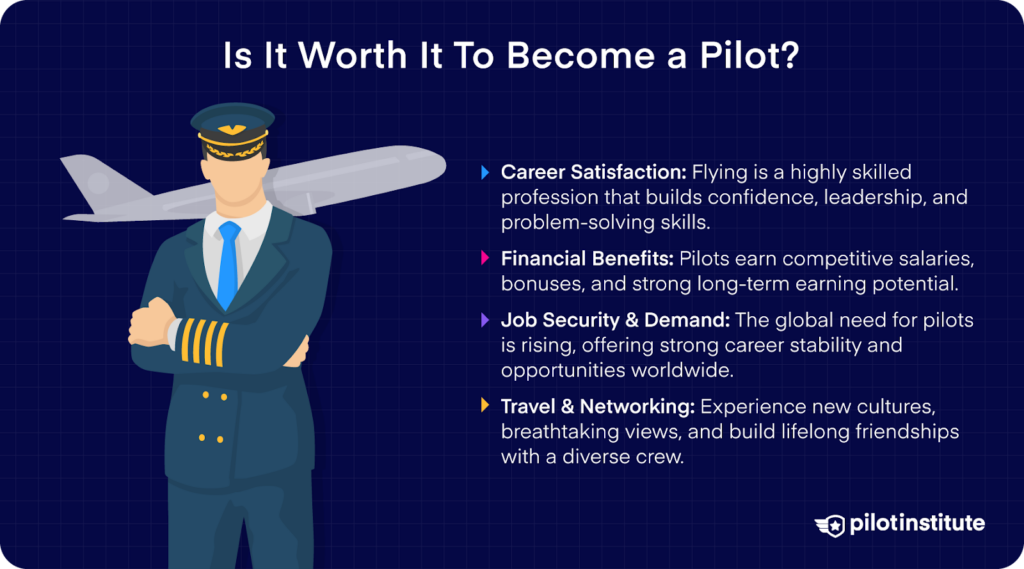
Despite these challenges, most pilots find the job incredibly rewarding. There are many benefits to the job. Pilots earn high salaries while traveling the world.
The thrill of flying and the satisfaction of working in a highly skilled profession make it all worthwhile.
Let’s get to the fun part—here are the best reasons to enter a career in aviation.
Career Satisfaction
One of the most fulfilling aspects of being a pilot is the satisfaction of working in a highly skilled profession. It takes a lot of knowledge, precision, and decision-making to fly an aircraft.
Nothing can match the sheer sense of accomplishment from landing your aircraft safely. You’d know that the world needs your skills in transporting passengers and cargo safely around the world, and this is something to be proud of.
You’ll also develop strong skills in problem-solving and leadership. Every flight offers unique challenges; each time you overcome them, you gain more confidence and grow as a pilot.
With that said, in this career, here’s something you should always keep in mind: There is nothing wrong with enjoying admiration, but keeping yourself humble and professional is what truly matters.
Financial Benefits
It’s common knowledge that pilots earn a competitive salary, but is it actually true?
While, yes, you’ll start with modest earnings as an entry-level pilot, the number will increase considerably as you gain experience.
Major airline captains can earn six-figure salaries, and pilots who work for international carriers can have even higher earning potential.
And aside from the base salary, you’d also get to enjoy bonuses and other financial incentives that make for quite a lucrative career.
Increasing Demand and Job Security
The demand for pilots is high and increasing. If you are able to obtain an FAA or EASA (European) license, your qualifications will make you very attractive to employers. Knowing these, you can rest assured that you’ll have strong job security.
You can take advantage of opportunities to work for airlines and many types of operations worldwide.
Looking for opportunities elsewhere? You can also work for private, charter, and cargo companies.
Ability to Travel
As a pilot, you’ll have the chance to see the world from a different perspective. You’d get to travel to foreign countries and see different cultures.
And as you travel, you also get to experience different views and climates. That’s a privilege most people don’t get to experience.
Good Working Relationships
You’ll be working with different types of people on your travels. You’ll interact with passengers, air traffic controllers, cabin crew, and other pilots.
Cabin crew and pilots are often a mix of different nationalities, which makes for a diverse and exciting work environment. How can you make the most of it? Build networks and foster relationships with people from all over the world.
You’d feel a great deal of teamwork when you work in aviation. This isn’t your typical office workplace. You’ll travel together with cabin crew and stay at the same hotels, often for days or sometimes even weeks at a time.
Because of this, flight crew often develop strong working relationships, sometimes even lifelong friendships!
Tips for Succeeding As a Pilot
If you are willing to put in the time and effort, becoming a pilot can be a great career choice.
No matter where you are on this path, here are some essential tips to help you succeed in your aviation career.
Choosing the Right Flight School
To set yourself on the right path, select the flight school and training program that’s right for you. Look for a school that is accredited, and check if its program offerings measure up to FAA standards.
Consider the following when looking at your options:
- Instructor experience.
- Aircraft availability.
- Student success rates.
You should also think about your budget and lifestyle. If you’re flying on a tight budget, you can take an online training program and build your hours in a flying club. Are you juggling other responsibilities? Then, you can check out modular or part-time programs.
Other variables will affect how each program aligns with your needs. It’s important to do your own research and listen to what students and instructors say.
Finding a Mentor and Networking
Aviation is a field where connections can open doors. Don’t be shy to seek out experienced pilots as mentors. They have a lot of guidance and advice, even words of motivation that will help you throughout your journey.
Join aviation communities where you can connect with like-minded individuals. Networking has helped a lot of pilots discover job opportunities that haven’t been advertised anywhere else. Plus, you’ll gain valuable insight from seasoned pros who’ve already flown the path to becoming a pilot.
Overcoming Challenges
Flight training can be physically and mentally demanding. How can you keep up with your lessons?
It will help to stay organized and maintain a consistent study schedule. If you find a particular topic difficult, don’t hesitate to ask for help! You can reach out to your instructors or even your fellow students.
Stay patient and keep a positive attitude. These traits will get you through obstacles more than you think.
Continuing Education and Staying Certified
The learning process doesn’t end once you get your license. The aviation industry is a competitive one, so you should always challenge yourself and upgrade your skills.
When you’re current, you have proof of recent flight experience before carrying passengers.
But beyond legal requirements, you’ll have to stay proficient. Proficiency is about developing and maintaining the skills you need in the cockpit.
Online Resources and Courses
Did you know that there are training courses you can take online?
You can even take your ground school online, complete with instructor endorsement for your FAA exam. Some of them offer lifetime membership and access to study and support groups.
Scenario-based training is possible even if you’re studying on your computer. This training approach lets you put what you learn into practice in real-life situations. In these scenarios, you can apply what you’ve learned and see if your actions were right.
Pilot Institute offers a structured but engaging curriculum. This makes for an accessible and therefore more effective pilot education.
Online learning resources can be a great way to supplement your training and stay ahead in your career. Look for high-quality courses designed by professionals to help you pass exams and stay sharp.
Conclusion
So, is it hard to be a pilot? From what we just talked about, sometimes, it can be! But for every initial test you take, there’s also a certificate you will earn. For every sacrifice you make, there is a reward you will receive.
Make sure you take the right steps to prepare yourself for the journey ahead. Math might feel like a hurdle, but it’s something you’ll be able to manage with the right tools and techniques! Keep yourself well-informed when making career plans and utilize the resources available to you.
Becoming a pilot is a huge investment, but you’ll also be pursuing one of the most exciting professions in the world.
One thing is for certain: You’re in for the adventure of a lifetime.

